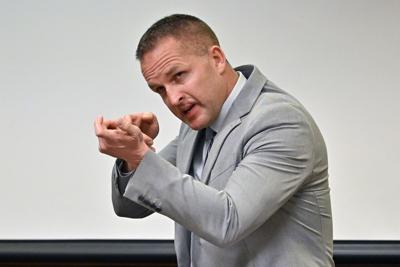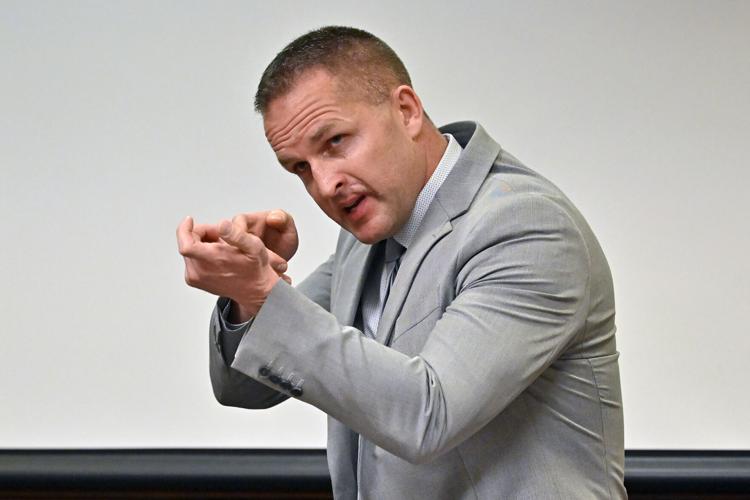LOUISVILLE, Ky. (WDRB) -- Attorneys for former Louisville police Detective Brett Hankison asked a judge to force prosecutors to turn over Breonna Taylor's cellphone, which was found next to her after police shot and killed her during a March 13, 2020 raid.
Attorneys for Hankison, who is scheduled to stand trial in October on two counts of civil rights violations and using excessive force stemming from his actions the night of the Taylor raid, believe the phone may contain evidence favorable to their client.
Despite repeated requests for the phone, Hankison's attorneys say the government hasn't turned it over. The prosecution has argued the phone has been examined by state forensic examiners who were unsuccessful in their attempts to extract data from the phone and remove the SIM card, according to court documents.
But Hankison's attorneys on Friday asked U.S. District Court Judge Rebecca Grady Jennings to compel prosecutors to turn over the phone to an expert for the defense, arguing "updates to commercial software in the industry" now allow for extraction of info from the phone "utilizing brute force when the passcode is unknown."
The defense argued this information was confirmed by an expert in digital forensics who worked for the Kentucky Office of the Attorney General Cyber Crimes Unit. And the prosecution also agreed with this, according to the motion, but said Taylor's phone "may have been compromised."
Prosecutors said someone in law enforcement had attempted "unsuccessfully to open (Taylor's) iPhone by entering the wrong password repeatedly," according to the motion from the defense. The FBI was unable to extract any data from the phone.
But defense attorneys want to have the phone looked at by their own expert.
Their argument for looking for information on the phone centers around whether Taylor knew about an ongoing series of raids that targeted narcotics trafficking on the night she was killed.
Hankison's attorneys argue that about 15 minutes elapsed between the first searches and that of Taylor's apartment, meaning there was "more than enough time" for others to notify her, including the main target of the investigation and her former boyfriend, Jamarcus Glover.
This is important, the defense argues, in determining whether Taylor and her then-boyfriend, Kenneth Walker, knew police might be coming or were surprised when police burst in, prompting Walker to fire a shot that led to officers firing back and killing Taylor, 26.
In 2020, police sought out a search warrant for Taylor's home as part of a broader investigation that focused on Glover. Police believed Glover may have been using Taylor's apartment to receive drugs and store money.
Kenneth Walker admitted to firing at police as they entered the apartment but claimed he believed the officers were intruders. He hit former officer Jonathan Mattingly.
Multiple Louisville Metro Police officers returned fire, killing Taylor. No drugs were found in her home.
Hankison's attorneys want to know if anyone called Taylor around the time of the raids.
In addition, evidence shows Walker had access to the phone and "called multiple individuals in the 10 to 12 minutes" between police arriving at Taylor's home and his surrender, according to the motion.
One of the key disputes in the case is whether police burst in, surprising Taylor and Walker, or whether they knocked and announced their presence repeatedly.
While police had a "no-knock" warrant signed by a judge, meaning they were not required to knock or announce themselves before entering the apartment, officers claim they did both multiple times.
But Walker and several neighbors said they never heard police knock or announce their presence, prompting the shooting.
Hankison's attorneys have asked the judge to allow their expert one hour to "independently verify that the iPhone is compromised," according to the motion. "Given what is at stake, this is a very reasonable and appropriate request."
This will be Hankison's third trial related to his actions the night of the raid. A federal jury in November 2023 deadlocked on two counts of civil rights violations and using excessive force.
A state Jefferson Circuit Court jury in March 2022 found Hankison not guilty on three counts of wanton endangerment.
The federal case is about Hankison firing 10 times from outside Taylor's apartment through a covered sliding glass door and blinded windows in Taylor's bedroom window, with three bullets flying into an adjacent apartment where Cody Etherton, Chelsey Napper and her 5-year-old child lived.
During the federal trial, LMPD officers testified that Hankison's actions on the night of the Taylor raid were "shocking," unfathomably dangerous" and "stomach churning," the prosecution said in closing arguments.
He fired "blindly, spraying bullets through two covered windows, ripping through walls into a neighboring apartment" where a family and a child were sleeping, said prosecutor Michael Songer, with the U.S. Department of Justice, in his closing arguments.
Hankison failed to isolate a target and acknowledged not being able to see who he was firing at or where exactly the person was, putting multiple lives in danger, Songer said.
Former defense attorney Stew Mathews told jurors have to put themselves in Hankison's shoes at the time, think about what he was seeing and experiencing as an officer was shot and dozens of bullets were fired after they burst into Taylor's home.
"If someone fires at the police, the police are going to fire back at you, and that's exactly what happened here," Mathews said.
Hankison testified he wasn't part of the investigation leading up to the raid and didn't even know the adjacent apartment was there. All Hankison knew was that fellow officers were under fire, he believed from an assault rifle, and that one officer had been shot.
He admitted he was mistaken, and the muzzle flashes were actually coming from Mattingly and Det. Myles Cosgrove, and that Walker only fired one shot from a handgun at police.
"Was I wrong that Mr. Walker shot more than one shot? I know that now," Hankison testified. "I fired to stop the threat, sir."
"It's a tragedy for a lot of people and a lot of families and I feel bad about it," Hankison said of the shooting, adding that he believed officers should never have been serving a warrant at Taylor's home to begin with.
But he said if given a chance for a do-over, he "would do the exact same thing" because he was trying to save the lives of his fellow officers.
Breonna Taylor Coverage:
- Ky. Court of Appeals upholds termination of Louisville detective who fired fatal shot in Breonna Taylor raid
- Call for change | Louisville activists reflect on death of Breonna Taylor 4 years later
- 'Breonna Taylor Act' for US ban on no-knock warrants reintroduced on Capitol Hill
Copyright 2024 WDRB Media. All Rights Reserved.














